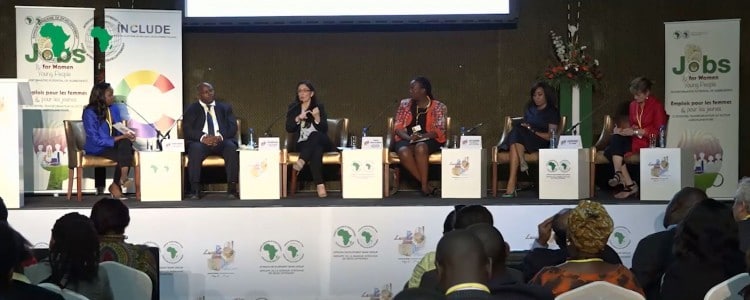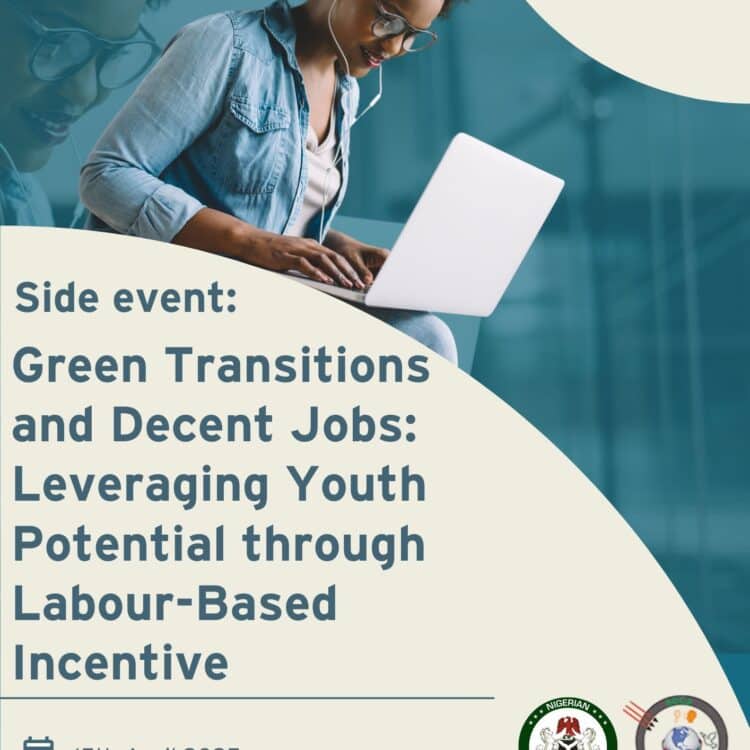There are many challenges involved in making agriculture more attractive to women and young people. Nevertheless, there is also much optimism and many initiatives taking place to overcome these challenges, as evidenced by the widely appreciated panel discussion on ‘Jobs for women and young people – the transformative potential of agribusiness’ co-hosted by INCLUDE at the Annual Meetings of the African Development Bank (AfDB) in Lusaka, Zambia on 23 May. Centred on the topic of agribusiness, this panel of experts discussed how agriculture can be transformed into a more productive sector and how it can create more employment for youth and women.
Women and youth should be supported by tailoring innovative finance to the farming cycle in order to improve their opportunities in agriculture through agribusiness. This was the recommendation that followed from the panel discussion. Panel members also recommended that youth and women be supported by providing mentorship and advice, as well as information on seeds, plant diseases and product resilience through agricultural research. Limited land ownership rights for women, an important barrier to women’s entrepreneurship in agriculture, also need to be addressed, agreed panel members.
Some panel members saw the perceived lack of ‘coolness’ of agriculture as another constraint on youth entering the sector. Despite offering high income potential, some panellists remarked that young people are not attracted to working in agriculture or agribusiness in the same way that they are attracted to economics or IT. Although not all experts agree that African youth perceive the sector as unattractive, according to panel member Ada Osakwe, founder and CEO of Agrolay Ventures, reframing agriculture as ‘agribusiness in value chains’ can help generate interest among youth. “As soon as young people realise that working in agriculture does not necessarily mean they only have to work with their feet in the dirt, the interest for the sector will grow”, said Osakwe, who was an advisor to Nigeria’s former Minister of Agriculture Akinwumi Adesina, the current AfDB president. Osakwe is definitely an ambassador of the perception change required. “I – dressed in high heels – can be a farmer. We are changing the narrative,” she said.
The fact that political will is needed to successfully implement these measures, came out strongly from the contributions of the panellists and the INCLUDE members in the audience. The politics of processes in agribusinesses need to be understood. One platform member cited the preference of customs officers for importing foodstuffs, rather than supporting the use of local crops in processing to strengthen local value chains, because imports raise state revenue.
When drafting policies, it is crucial to integrate youth and women into agricultural strategies, according to panel member Yana Watson Kakar of Dalberg Global Development Advisors. Having been involved in formulating two separate ‘High 5’ priority areas for the AfDB, agricultural transformation and youth employment, she stated that while preparing for the panel discussion she realized even more how much these areas are connected and cannot be seen in isolation.
Researchers can also play a central role in shaping the view that strategies for youth and women are an integral part of agricultural transformation, according to Wanjira Kamau-Rutenberg, Director of African Women in Agriculture and Research and Development (AWARD), who could not resist pointing out that also “science is cool”. Especially in the enhancement of value chains, she sees much potential for the contribution of women scientists, whose work and perspective can make game-changing differences at the start of such chains, for example, by choosing to produce products that improve the lives of women. But research only works when it is meaningful at the local level: “If you can have researchers that work on the local context, then you can really start to leverage what is possible on this continent”, said Kamau-Rutenberg.
Improving employment opportunities for women and youth in agriculture and through agribusinesses and reducing inequality were also key issues mentioned at the launch of the African Economic Outlook 2016 earlier that day at the Annual Meetings. In addition, the Outlook mentions the potential of urban markets for agricultural produce and the non-agricultural jobs that rural residents can have in cities, in addition to their agribusinesses. The focus of the Outlook on jobs for women and youth and on agricultural transformation resonates with the INCLUDE thematic approach, which focuses on the inclusion of youth and women in development, with agricultural transformation as an important aspect. This approach to inclusive development should not be seen as a side track in the development debate, but as an inspiration for mainstream development policies. Agriculture is not only an issue at local and national levels, but can be a way to encourage the development of Africa as a whole. As panel member Watson Kakar concluded, “Agriculture is not just a way of life, but a way of investing in a continent”.





